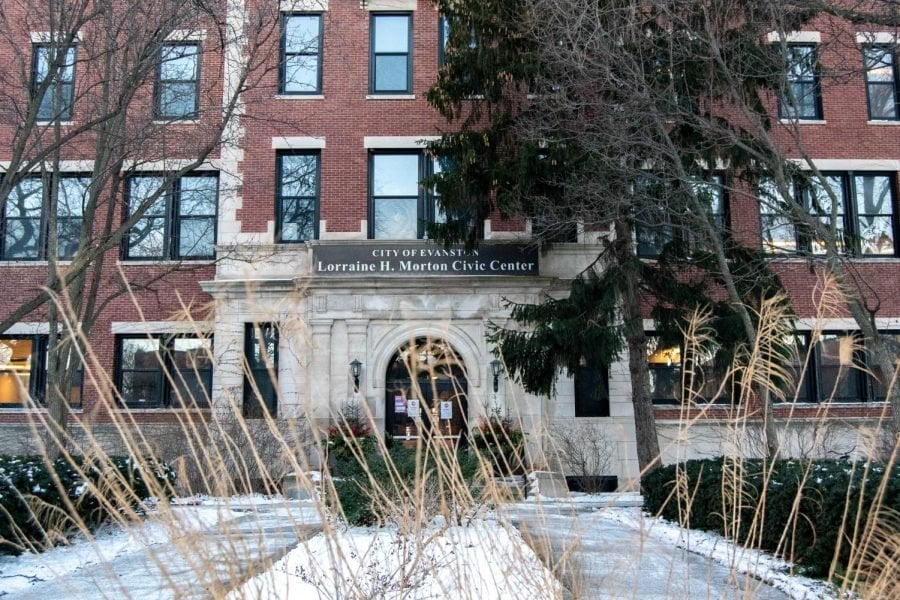City council declares climate emergency in Evanston
Daily file photo by Angeli Mittal
The Lorraine H. Morton Civic Center. City Council unanimously passed a resolution Monday night declaring a Climate Emergency in Evanston.
April 26, 2022
City Council unanimously passed a resolution declaring a climate emergency in Evanston and implementing an immediate mobilization effort to restore climate stability on Monday night .
The resolution passed following a statement from Mayor Daniel Biss, who acknowledged the family of Adam Abaijan, the city’s recreation program manager of Lakefront Operations. Abaijan died on Wednesday.
The resolution says the city will increase its commitment to reducing greenhouse gas emissions. It calls for City Council to implement the Climate Action and Resilience Plan as a primary council goal. CARP’s goals include 100% renewable electricity for all properties by 2030 and carbon neutrality by 2050.
The climate emergency resolution was introduced jointly by Mayor Daniel Biss, Alds. Eleanor Revelle (7th) and Jonathan Nieuwsma (4th) and the Evanston Environment Board.
“I wholeheartedly endorse the concept of the climate emergency, especially since it’s paired with 22 concrete steps we’re committed to taking this year,” Nieuwsma said. “I’m less frustrated and more optimistic now after this vote passed.”
The city adopted CARP in 2018, setting sweeping goals to combat climate locally. However, more recently some residents have criticized the plan for being too vague.
Monday’s resolution will provide the city with a more specific schedule of legislation and projects. The council hopes to remain accountable and on track.
Shortly before City Council voted on the climate emergency resolution, Cara Pratt, Evanston’s sustainability and resilience coordinator, presented a CARP update. She said the city has achieved its goal of 100% renewable energy for municipal operations by 2020.
“City government is more nimble than other levels of bureaucracy while also having the authority to enact creative legislation that has a tangible impact on the lives of our neighbors and our neighborhoods,” Pratt said. “At the same time, the urgency for action on climate change is growing.”
Pratt said the city is also on track to meet many CARP goals including reducing building energy consumption by 2025, achieving 100% renewable energy supply for all properties in Evanston by 2030 and reducing building energy consumption by 25% by 2025.
However, the city is not on track for other key goals within CARP such as a zero waste, carbon neutrality for municipal operations, increasing the community waste diversion rate and the planting of 500 net new trees by 2025.
Pratt said achieving these goals will cost hundreds of millions of dollars.
“That isn’t to say it should cost taxpayer money locally,” Pratt said. “I think it’s to say that we, as a team, need to think about creative solutions for finding ways to finance as well as to continue to robustly staff many city departments that have a stake in different aspects of this plan.”
Pratt said the most urgent hires include a staff member who can enforce the energy and water benchmarking ordinance and additional staff on the forestry department.
Some Evanston Township High School students came to speak in favor of Resolution 32-R-22. One sophomore read testimonials written by high school attendees at ETHS’ first Climate Justice Conference. They said CARP’s implementation is crucial for young people especially.
“CARP would allow for the children of Evanston to experience a higher quality of life,” they said. “One student wrote: ‘I am terrified for our future. I’m terrified of the irreparable damage and lives lost to climate change, and I’m terrified of being complacent.”
Email: [email protected]
Twitter: @avanidkalra
Related Stories:
— City Council to re-interview four city manager candidates by end of April
— City Council initiates grant agreement process with the AUX to support Black-owned businesses


